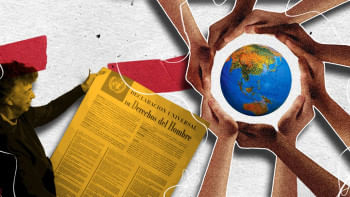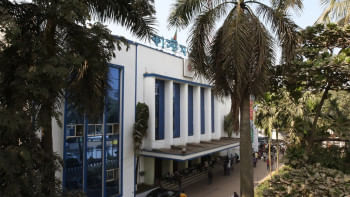How to keep transnational companies accountable

On June 26 2014, the Human Rights Council adopted Resolution 26/9, by which it decided to establish an open-ended intergovernmental working group (OEIGWG) on transnational corporations and other business enterprises with respect to human rights. The group was tasked with developing a legally binding treaty (LBT), currently in its draft stage, that would govern the operations of multinational companies and other business enterprises under international human rights law (IHRL).
The ninth session of the working group took place on October 23-27, which provides an opportunity to discuss key issues pertaining to international law and transnational companies (TNCs).
The extraordinary ability of impacted communities and organised civil society to influence the global discourse on the responsibilities of TNCs has resulted in negotiations, which are already redefining what is feasible under human rights law. Even though it is largely insufficient to address all of the gaps in international law currently in place, the European parliament's proposal for a directive on corporate sustainability due diligence, other recently approved national-level due diligence laws (France and Germany), and novel human rights legal liability laws currently being discussed in Brazil and Argentina are all direct or indirect results of the discussions this LBT process has opened up.
Discussing TNCs without including their environmental and human rights effects is becoming ever-easier due to this historic UN instrument. Text submitted in compliance with A/HRC/52/41 paragraph 25 (g) and paragraph 25 (i) has served as the foundation for state-led, direct, and substantive intergovernmental negotiations on TNCs as well as other business enterprises and human rights during the ninth session of the working group.
The impunity TNCs enjoy
Millions of people live in great poverty and starvation due to pandemics, wars, and climate disasters. Nonetheless, a tiny number of billionaires who control and manage most TNCs continue to amass unheard-of sums of money. The fact that TNCs operate on a global scale without being subject to any laws or regulations provides one way to view this reality. They are only subject to legislation at the national and regional levels, which is frequently insufficient to hold them responsible for human rights abuses. Due to the regulatory gaps and loopholes, many TNCs can evade criminal prosecution for their involvement in crimes of human rights, the environment, or tax evasion.
For nations in the Global South, where there is little ability to control or enforce laws against TNCs, whose economic might dwarfs their GDPs, this is even more intimidating. Due to this environment, TNCs routinely violate human, labour, and environmental rights. TNCs are largely unpunished despite a few notable historical court cases. For example, a Dutch court ordered Shell to deepen carbon cuts. At the same time, the oil firm Total is being prosecuted in France for its incompetence during the Palma attack in Northern Mozambique. However, a transnational system of corporate impunity is in operation.
The treaty's supporters and opponents
Ecuador has been chair of the OEIGWG since 2014, co-writing Resolution 26/9. Critics argue the consolidated texts favour TNC proposals. Most Global South nations support introducing a comprehensive international legally binding treaty to hold TNCs accountable and ensure access to justice. However, the US, Japan, Canada, Australia, and other industrialised nations with TNC headquarters have refrained or attempted to halt the process.
But over time, the European Union and its member states have changed from a first stance of rejection and non-participation to offering some assistance, as in France's situation. Meanwhile, European civil society organisations (CSOs) have sharply criticised the EU's overall position for its lack of involvement and frequently ambiguous statements regarding the necessity of TNC duties.
The European civil society's persistent pressure has ensured that the EU does not entirely abandon this process. The OEIGWG stands apart from the others in the history of UN working groups due to the sustained participation of numerous delegates from affected communities, trade unions, social movements, and CSOs over an extended period. This year, eight delegates have been sent to Geneva by the Global Inter-Parliamentary Network, the largest coalition of over 250 national and regional parliamentarians and senators from around the globe supporting the UN legally binding treaty.
The treaty's key principles
The OEIGWG reaffirms the UN Charter, human rights treaties, different conventions, the Universal Declaration of Human Rights (UDHR), the Vienna Declaration, and the 2030 Agenda for Sustainable Development.
The working group emphasises the role of civil society in promoting human rights and respect by businesses, and in turn preventing abuses. It highlights the disproportionate impact of these abuses on vulnerable groups. The group also calls for integrating a gender perspective in measures, aligning with international standards like the Convention on the Elimination of Discrimination against Women and the Beijing Declaration.
There are two dozen articles in the proposed treaty, encapsulating all aspects of TNCs and their business transactions, and the impact of the same on human rights. New understandings have been carved out on the definitions of victims and their rights and protection, human rights abuses, business activities and relationships, regional integration organisations, human rights due diligence, and relevant state agencies. Objectives and scope have been determined afresh. The dimensions of prevention, access to remedy, legal liability, jurisdiction, the statute of limitations, along with the dynamics of applicable law, mutual legal assistance, international cooperation, consistency with international law, institutional arrangements, implementation, relations with protocols, and settlement of disputes have been enunciated with pragmatism.
The way forward
The draft treaty addresses the multibillion-dollar voluntary corporate social responsibility sector, which has not improved the conditions of millions of workers in international supply chains, who endure hazardous and precarious labour for pitiful pay. If ratified, it would rectify the flawed global supply chain model.
Although multinational corporations have several legal protections, far too many reject the idea that they also have obligations under the law, particularly to individuals whose labour produces their profits. Therefore, a proposed UN treaty with global legal effect is bound to be a significant step towards guaranteeing that governments hold multinational corporations legally responsible. It would, with human rights due diligence, lessen the worldwide crisis of worker abuse and exploitation that would ultimately guarantee fairness, justice, and human rights.
Dr Nafees Ahmad is associate professor at the Faculty of Legal Studies in South Asian University, New Delhi. He can be reached at [email protected].
Views expressed in this article are the author's own.
Follow The Daily Star Opinion on Facebook for the latest opinions, commentaries and analyses by experts and professionals. To contribute your article or letter to The Daily Star Opinion, see our guidelines for submission.

 For all latest news, follow The Daily Star's Google News channel.
For all latest news, follow The Daily Star's Google News channel. 









Comments